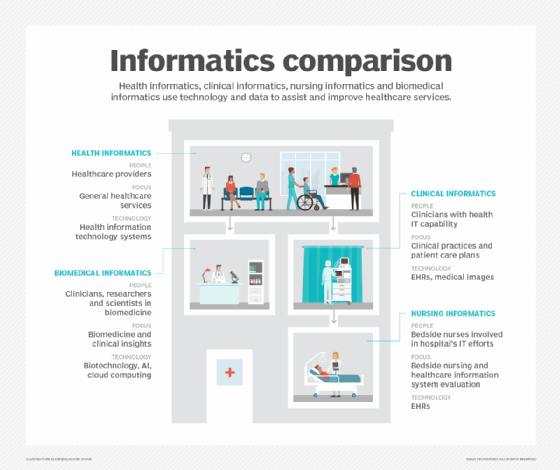What is a registered health information technician (RHIT)?
A registered health information technician (RHIT) is a certified professional who creates and verifies electronic health records. An RHIT also analyzes patient data, with the goal of controlling healthcare costs and improving patient care.
Although an RHIT is not involved directly with patient care, the job does involve frequent communication with doctors and other healthcare professionals to ensure efficiency and precision. RHITs often specialize in coding diagnoses and procedures using ICD-10, a system physicians and other healthcare providers use to classify and code diagnoses, symptoms and procedures recorded in conjunction with hospital care. Some RHITs specialize in coding or compiling data for specific diseases or illnesses.
Many RHITs work in hospitals and other healthcare facilities, including physicians' offices, nursing homes and mental health clinics. RHITs are also found in organizations that use patient data, such as pharmaceutical companies.

How to become an RHIT
To become an RHIT, an applicant must complete at least an associate degree from a health information management program accredited by the Commission on Accreditation for Health Informatics and Information Management Education (CAHIIM), in addition to passing an American Health Information Management Association (AHIMA) certification test. The exam lasts three-and-a-half hours and consists of 150 multiple-choice questions and covers topics such as information governance, disclosure of protected health information, data analytics and revenue cycle management (RCM).
Alternatively, an RHIT must have graduated from a health information management program that has been approved by a foreign association -- such as the Canadian Health Information Management Association -- that has a reciprocity agreement with AHIMA.
RHITs must renew their certification every three years and earn 20 continuing education units during that period. They also pay a $150 recertification fee.
Salary and expected job growth
Although an RHIT certification does not determine a job's salary, it can help bolster a health information professional's resume and job prospects. The salary for an RHIT-certified professional can vary depending on location and experience. It may range from $45,000 to slightly over $100,000. A survey by the AHIMA gave an average salary of about $70,300 for RHIT professionals.
The job outlook for RHIT jobs is strong, likely corresponding to the healthcare industry's overall growth as baby boomers grow older. According to the U.S. Bureau of Labor Statistics, job opportunities for medical records and health information technicians are projected to grow 13% from 2016 to 2026.
There is some concern for the future value of RHIT as artificial intelligence (AI) becomes more prevalent. Many entry-level jobs, such as classification and record verification, may be easily automated.
Common RHIT job titles
According to the University of Wisconsin, which offers a health information management degree program, someone with an RHIT certification might hold one of the following job titles:
- clinical auditor or coder;
- health information technician;
- healthcare data analyst;
- cancer registrar;
- clinical data collection and reporting specialist; or
- quality improvement specialist.
RHIT Exam Domains
The RHIT certification exam is divided into six domains or areas of knowledge. To pass, the applicant should be proficient in each of these areas.
Domain 1: Data Content, Structure, and Information Governance. This area includes the core responsibility of RHIT to care for electronic healthcare data. This includes best practices and industry guidelines to work with healthcare information. They should be able to examine a healthcare record to identify and fix errors.
Domain 2: Access, Disclosure, Privacy, and Security. This area consists of the ability to work safely with healthcare information. They should know applicable laws, including the HIPAA healthcare statute.
Domain 3: Data Analytics and Use. An RHIT professional can use existing data and data analytics to create reports and charts to understand healthcare data.
Domain 4: Revenue Cycle Management (RCM). RHIT professionals play a major role in healthcare coding and classification. They should be knowledgeable in standardized codes from classification systems like the International Classification of Diseases (ICD) and Current Procedural Terminology (CPT).
Domain 5: Compliance. Information handled by RHIT professionals should be accurate and compliant with government regulations and industry standards. They should know proper reporting procedures for non-compliance.
Domain 6: Leadership. They should be able to work in a team and with various other departments in an organization. A well-qualified professional helps and educates others.
RHIT vs. RHIA
Similar to an RHIT, a registered health information administrator (RHIA) is an AHIMA-certified health information management professional. However, the two differ in several ways, such as educational requirements.
An RHIA must have received either a bachelor's or master's degree from a CAHIIM-accredited health information management program and pass an AHIMA certification exam. An RHIA also deals more directly with HIPAA privacy and security, as well as data governance and analysis, while an RHIT tends to specialize in data capture and input.
Because of the difference in education and responsibilities, RHIAs earn more than RHITs, though salary estimates vary.
RHIT career progression and growth
RHIT certification can be a good start for careers in healthcare information. RHIT can lead directly into RHIA certification. They cover many of the same areas, but RHIA expands on areas relating to information management and compliance. Also, the RHIA certification is better suited for a managerial role.
AHIMA also offers several other certifications that cover areas covered in RHIT in more detail. Certified Coding Associate (CCA) and Certified Coding Specialist relate to correctly identifying medical coding and costing. Other certifications relate to data analysis, privacy/security and documentation.
As data analytics becomes essential for healthcare organizations, stakeholders need to understand the basic vocabulary related to the process. Explore common data analytics terms in healthcare. Also, AI tools are changing healthcare by making it more efficient and improving care quality. Check out some of the top AI tools available in healthcare today.







